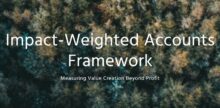In order to reduce global emissions and make the Paris agreements, in order to reduce poverty and in order to achieve the (other) SDGs, the way we look at our economy should change. One of the pathways to do so, is for companies to understand, report and manage their impact better. Impact-Weighted Accounts (IWAs) are a way for organisations to quantitatively assess their impact. They describe how organisations create or destroy long-term value to all stakeholders, beyond the financial aspect. The Impact Economy Foundation aims to help companies to work with IWAs by making the approach how to do so publicly available. Impact Economy Foundation is holding a public consultation on the Impact-Weighted Accounts Framework until 9 September 2022.
- All readers and experts are invited to participate in the consultation. You can submit your responses, either in full or in parts, at your own convenience.
- Input will be discussed with the IEF Board, Academic Council and Working Group members of the IWAF.
- Based on the input in the public consultation phase, a final version of the IWAF will be developed at the end of 2022. A synthesis of (anonymised) reactions will be made available.
- The consultation consists of 15 questions. We kindly request you to submit your input by 9 September 2022.
- We also welcome other suggestions / questions / thoughts. You can do so by sending your input to iwaf@impacteconomyfoundation.org.
The Impact-Weighted Accounts Framework aims to fill the gap of a missing international standard that ensures complete and consistent IWAs. IWAF builds on concepts from other (non-)financial reporting standards and identified five common topics of (non-financial) impact assessment.
The IWAF answers these common challenges with ten principles to ensure that IWAs inform impact decisions
In our current system, financial value is created too often at the expense of society and the environment. We cannot afford to do so. Organisations are moving toward creating sustainable value. In the (near) future, organisations that fall behind risk losing their licence to operate.
Managing sustainable value creation is impossible without measuring it first. However, that is challenging:
- How to reliably measure and compare (non-financial) value?
- How to engage stakeholders and ensure organisations act?
Sustainable value can be measured through impacts. Impacts show how activities affect societal welfare and the natural environment. Impacts can reflect different types of value (financial, manufactured, intellectual, human, social and relationship) and include effects on different stakeholders.
Impact-Weighted Accounts, or IWAs, are a way for organisations to quantify their impacts. The uptake of compiling and publishing IWAs is a key step in the transformation of our economy into an impact economy: a sustainable economy that creates value for everyone.






